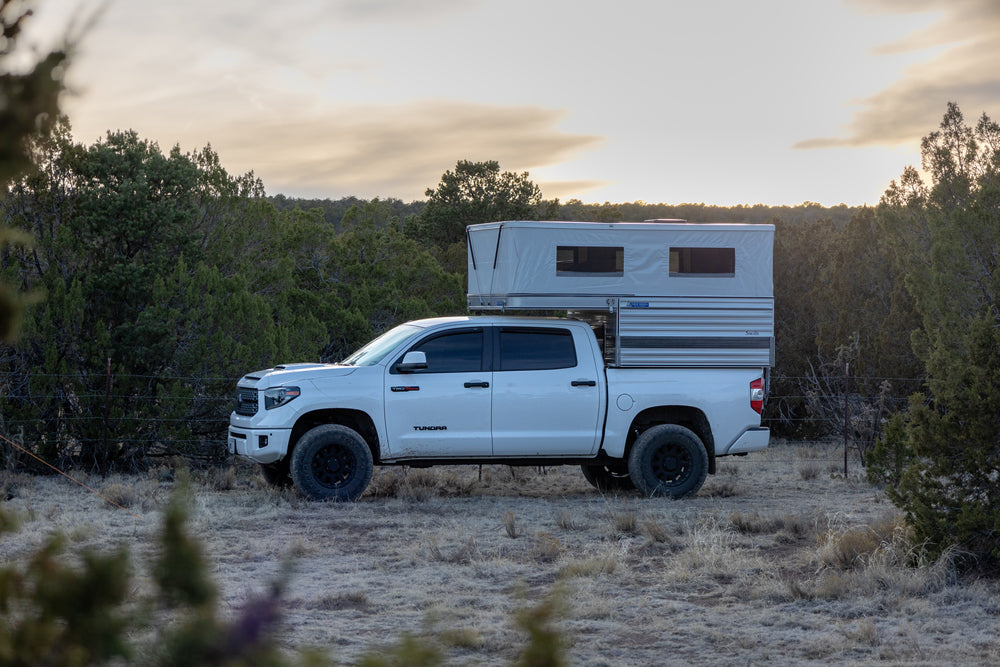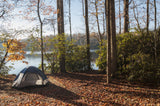Are you an outdoor enthusiast looking to take your camping adventures to the next level? Then truck bed camping may be a great (and perhaps unexpected) option for you. It's a convenient and cost-effective way to explore the great outdoors while having all the comforts of home right in your truck bed. In this guide, we'll walk you through everything you need to know to get started on your next camping adventure.
What is a truck camper?
A truck camper is a compact and versatile habitat designed to fit snugly into the bed of a pickup truck. It's like having a cozy, portable home on wheels that offers a fantastic camping experience without the need for a separate towed vehicle. Installation is also relatively easy — just slide the camper into the bed of your vehicle and secure it to the truck’s bed rails or tie-down points. Some models may also require additional stabilizing jacks or supports to ensure a safe and stable setup.
When searching for a truck camper, you may come across a variety of names such as slide-in camper, pickup camper, truck bed camper, flatbed camper, in-bed camper, cab-over camper, and lightweight truck camper. No need to get overwhelmed by the verbiage — they all refer to the same convenient setup with slightly different layouts.
Weight & exterior size
Truck campers come in a range of sizes and weights, so you can find one that perfectly suits your needs. On average, their lengths can vary from around 6 to 18 feet, with heights ranging from 4 to 8 feet. As for weight, it depends on the type of camper and the amenities it offers, but they generally stay within the range of 700 to 4,000 pounds. This makes them lighter than traditional trailers, making them easier to maneuver. However, be sure to double check your truck’s payload capacity to ensure it can handle transporting this weight.
Capacity
Most truck campers are designed to accommodate one to three people max. Keep in mind that the compact size means they might not provide as much space as larger trailers, but they make up for it in other ways. Additionally, many truck campers come with clever storage solutions to maximize your available space, such as cabinets, overhead compartments, and under-bed storage areas to keep all your necessities, gear, and equipment where you need them.
Notable features
Although the bed of a truck may seem to offer little space for comfort, truck bed campers prove otherwise. These smaller abodes are designed to maximize this space without feeling cramped. In fact, many come with kitchens equipped with cooktops and sinks, comfortable sleeping areas, and even bathrooms with water hookups. Certain models also expand horizontally when parked, giving you a little extra breathing room and space if you decide to embark on a short trip with friends or family.
Cost
So how much does a truck camper cost? Because they’re smaller, truck bed campers are a more affordable option compared to trailers and large RVs. While prices can vary depending on size and amenities, you can expect to pay anywhere between $8,000 to $55,000 for a new travel habitat with all the bells and whistles, and around $1,000 to $10,000 for used models that have more standard features.
Types of truck campers
There are two main types of truck campers: hard-sided (or slide-in) campers and pop-up campers. Hard-sided campers are what most people envision when thinking of truck campers — they have solid walls and a fixed roof, providing excellent insulation and protection from the elements. This makes them the most suitable for year-round camping. Full flatbed campers are a subtype of hard-sided habitat that, instead of being seating within a pickup bed, are actually made for a completely flat bed, and they can be as wide (if not wider) than the cab.
Pop-up campers, on the other hand, feature a collapsible design that "pops up" when parked, revealing additional living space. This design allows for a lower center of gravity while driving, making them popular for overlanding. The integration with the existing vehicle is another key advantage, as it allows for smoother handling and improved off-road capabilities.
What kind of truck do you need?
Choosing the right truck for your camper is crucial — you don't want to end up with a camper that's too big or too heavy for your truck to handle. This can not only damage your vehicle and camper, but be too dangerous to drive. Pay attention to key metrics like payload capacity and center of gravity to gauge whether a truck has the strength, power, and size to handle the dimensions and weight of a certain camper.
While there are truck campers on the market for short beds, standard beds, and long beds, having a bigger and stronger truck will give you more options to choose from. For example, a truck camper for a 6.5-foot bed (the average size of a truck bed) should not exceed 8 feet in length and should stay within a weight range of 1,300 to 3,200 pounds if the payload capacity for the vehicle is half a ton. Popular trucks, like the Ford F150 and Chevy Silverado, can usually handle an average truck camper, but it's always wise to double-check the specific weight requirements as this varies per car brand.
Advantages of truck campers
Truck campers are small but mighty, granting those with a love for the outdoors the same capabilities as a standard RV or trailer. Let's explore why truck campers are gaining popularity and winning the favor of adventurers far and wide.
Mobility & versatility
Truck campers offer unmatched mobility. You can easily explore rugged terrain and tight spots that larger trailers can't access. Plus, once you park and set up camp, you still have your trusty truck to explore the surrounding areas without detaching anything. Or, if you’d like, some truck campers allow you to detach and “park” the camper portion, leaving the truck free for further use and driving.
Cost-effective travel
Compared to buying a separate RV and towing vehicle, truck campers are more cost-effective. They save you money on gas and maintenance, and you won't have to pay for storage like you might have to with a larger trailer (although all of TAXA’s vehicles are garageable and fit in any standard-height garage).
Compact comfort
Don't underestimate the coziness of a well-designed truck camper. Many come equipped with everything you need for a comfortable camping experience, allowing you to enjoy the great outdoors without sacrificing creature comforts.
Off-the-grid camping
Truck campers are designed for boondocking and off-the-grid adventures like overlanding. With water hookups and built-in solar power systems, you can go days without needing to plug into external power sources.
Easy storage
When you're not on the road, storing your truck camper is a breeze. It won't take up valuable driveway space or require a dedicated storage facility like larger RVs, which can add up in the off-season.
Disadvantages of truck campers
While truck campers offer a fantastic camping experience, they do have some limitations. However, many of these are simply the trade-offs for their form factor and benefits.
Limited space
Due to their compact size and the need for these habitats to fit in the bed of a truck, truck campers might not provide as much living space as larger trailers. If you prefer roomier accommodations or have a larger party that will frequently travel with you, you might consider other options like TAXA's current lineup of larger adventure vehicles.
Fewer amenities
Some truck campers might not come with all the luxurious, full-sized add-ons you'd find in larger RVs. However, they are designed to prioritize functionality and efficiency over lavish amenities. Nonetheless, truck campers come pretty close to replicating the feel of an RV, with beds, pull-out tables, functional kitchens, and full bathrooms available to bring home necessities on the go.
Tall clearance
While the compact nature of truck campers is an advantage for off-road adventures, it can be a drawback when traveling from one destination to another. Since truck campers are often taller than the cab of the truck itself, this added height can pose challenges when driving under low bridges or navigating tight spaces, potentially limiting access to certain routes or campsites. The taller profile can also create some wind resistance, although this drawback is less pronounced compared to larger trailers.


